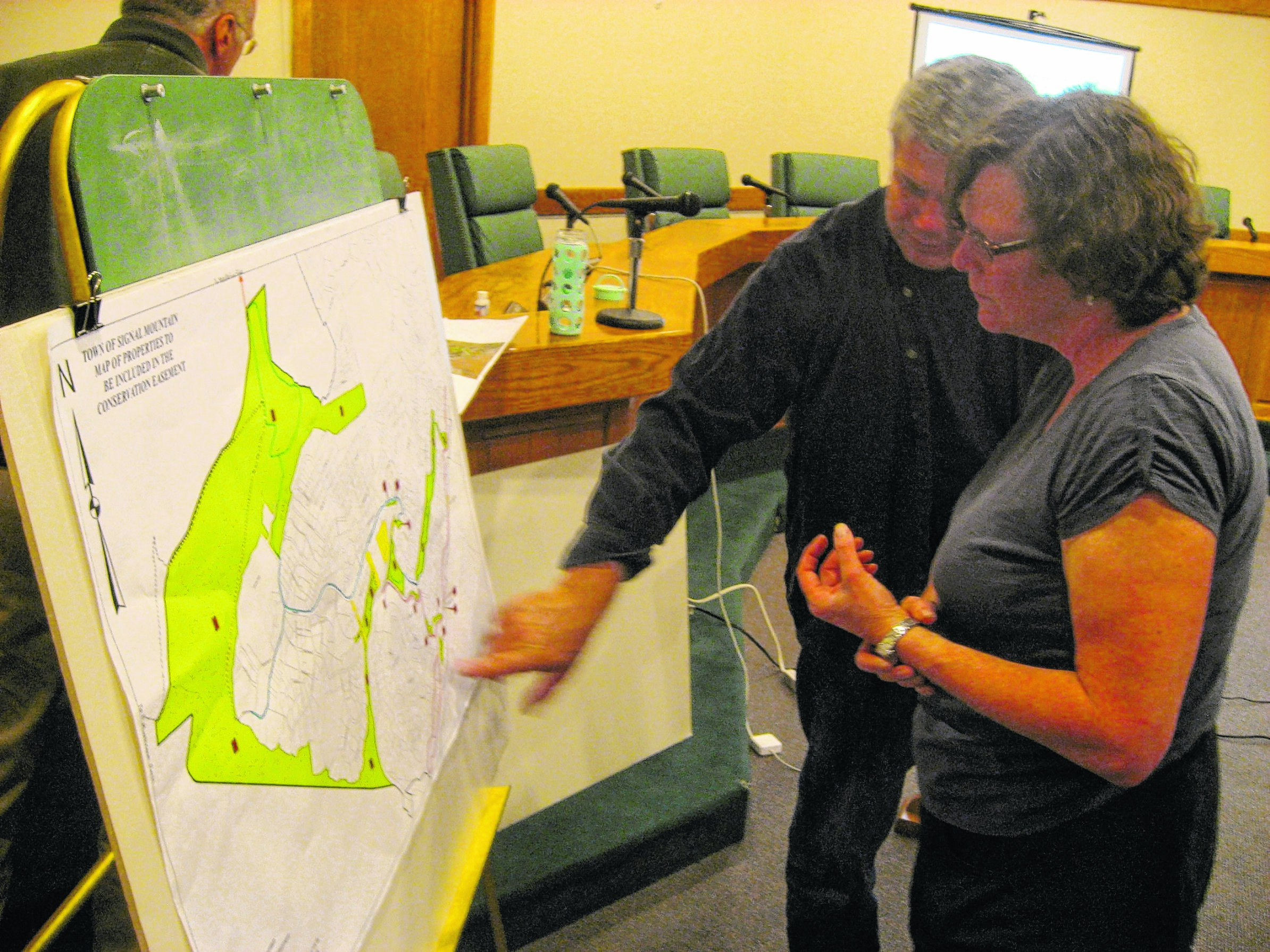It's hard to know what the future holds, and that's still the case with the town of Signal Mountain's proposal to place 11 natural areas in conservation easements.
"The corrective action is just so radical and different than current practices that before I go there I've got to be really sure and we've got to have the community behind us," said Councilman Dick Gee.
About 50 people attended the first meeting designed to provide information on the properties under consideration and the motivation behind protecting them, as well as the mechanism being considered. All 13 parcels in question were deeded to the town for the public to enjoy, said Councilwoman Annette Allen, who is helping spearhead the proposal. Some already have easements imposed by the original landowner.
"It's really to honor the intent of the original landowners," she said of the legal restrictions being considered for the rest of the properties. "They donated land to be used for public areas. This is really the only way we've found in our research that is foolproof."
Restrictive language in deeds hasn't proven to be 100 percent effective, she said.
"People when they want to do things sometimes they just do it, especially in tough economic times when the budget's tight and they don't want to raise taxes and it looks like low-hanging fruit to sell off some park lands," Allen said.
Even passing town laws protecting the lands without placing them in a conservation easement could have the same outcome, she said.
"The problem with the law is that it can be rescinded, so that doesn't seem like a permanent enough solution," said Allen, adding that federal and state grant restrictions only apply to lands with grant-funded trails.
While she and others see the restrictiveness of a conservation easement as a good thing, some are worried they may prove too binding, keeping the town from performing what it deems as necessary upgrades and outlawing proper uses which cannot yet be foreseen.
Going for the greenThe following properties are being considered for conservation easements. Combined with sewer and utility easements, the protection of all would create an uninterrupted trail system throughout the town that would connect with the state-owned Prentice Cooper large natural area.Rainbow Lake wilderness areaArea below the bluffs at Edwards PointParcel on the west side of U.S. 127 - Remnants of an old Federal road can be seen here. The property is already protected through a conservation easement held by River Gorge Trust that was placed on the land before it was donated to the town.James Park and Lena GivensLot to the south and southeast of CVSShoal Creek near PalisadesArea between Norvell Drive and PalisadesGreen Gorge - A revisionary clause in the deed states that if the area is no longer used as a park, it reverts to the family and its heirs.Dogwood ParkWilder Road Gorge between Wilder Road and North PalisadesArea between Palisades, Shoal Creek and U.S. 127Overlook Park
"We understand the town has needs, and one thing it needs is flexibility," said Jim Brown, president of the River Gorge Trust, which has been the proposed holder and therefore enforcer of the easements. "No easement is so rigid and restrictive we cannot work with the landowner as long as it doesn't violate the [easement's] intent. It could be crafted in such a way that there's room to negotiate any problems we might have under the umbrella of intent, which is to have parks."
Should his organization, which already holds easements on thousands of acres of local land primarily deeded by private landowners, cease to exist, all the land and easements it holds would be "transferred to a likeminded organization."
"I can see why easements are attractive to private landowners; they don't live forever and they don't have the power of zoning," said resident Joe Dumas. "I think this is a solution in search of a problem. If you tie the hands of future councils to keep them from doing bad, you're also keeping them from doing good things."
Although Allen was "pretty sure every single person said yes," they would like to see each of the properties in question "always remain a park," Gee referred to the group of parks supporters as a "small biased group" and said he wants to hear from the community at large. Of those that voted, the almost unanimously preferred method of achieving this was through conservation easements with the River Gorge Trust.
"The silent majority; they're out there and just keep their mouths shut," said Vice Mayor Susan Robertson. "How do we get them to open them? Do we need a [public relations] person?"
Council members discussed doing their own community outreach by taking the presentation to local groups and organizations. An unbinding referendum is also being considered, either on the presidential primary ballot in March or final vote in November, which will also feature several Town Council candidates. Town Manager Honna Rogers is checking to see if a fee would be associated with this.
"Once the council feels we have a clear picture of what the citizens want and we decide whether to move forward, at that point we'll have more public meetings to ask citizens what they want to see through these agreements," Allen said.
There will be surveying and legal costs should the town move forward, but she said these will not be delved into without a "firm commitment from the town."
"I do not see this coming out of taxpayers' money," she said. "The parks board would raise the money - set up a fund - ... and look to see what grants are available."
